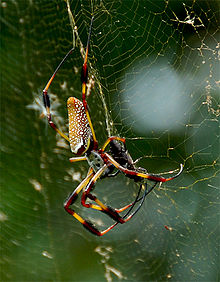Arachnology is the scientific study
of spiders and related animals such
as scorpions,pseudoscorpions, harvestmen, collectively
called arachnids. However, the study of ticks and mitesis
sometimes not included in arachnology, but is called Acarology. Those who
study spiders and other arachnids are arachnologists.
The word arachnology derives
from Greek "spider"; and -logia.
Arachnology as a science
Arachnologists are primarily responsible for classifying
arachnids and studying aspects of their biology. In the popular imagination
they are sometimes referred to as 'spider experts'. Disciplines within
arachnology include naming species and determining their evolutionary
relationships to one another (taxonomy and systematics), studying how they
interact with other members of their species and/or their environment
(behavioural ecology), or how they are distributed in different regions and
habitats (faunistics). Other arachnologists carry out research into the anatomy
or physiology of arachnids, including the venom of spiders and scorpions.
Others study the impact of spiders in agricultural ecosystems and whether they
can be used as biological control agents
Popular
arachnology
In the 1970s, arachnids -
particularly tarantulas - started to become popular as exotic pets.
Many tarantulas thus become more widely known by their common names such as
the Mexican redknee tarantula (Brachypelma smithi).
Various societies now focus on the husbandry, care, study
and captive breeding of tarantulas, and other arachnids. They also typically
produce journals or newsletters with articles and advice on these subjects.
Examples would be:
- American Tarantula Society
- British Tarantula Society
- Deutsche Arachnologische Gesellschaft

What you're saying is completely true. I know that everybody must say the same thing, but I just think that you put it in a way that everyone can understand. I'm sure you'll reach so many people with what you've got to say.
ReplyDeleteHey keep posting such good and meaningful articles.
ReplyDelete